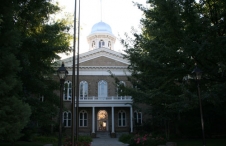Barbara Vucanovich
Congresswoman Barbara Vucanovich was elected in 1982 to represent Nevada's Second Congressional District. She retired in 1996 after seven terms, having served the second longest term of any Nevadan in the U.S. House of Representatives. (Walter Baring served ten non-consecutive terms). Vucanovich was the first woman elected to represent Nevada in Congress.
Born in 1921 at Camp Dix, New Jersey, Vucanovich grew up in New York State. Her father, General Thomas Farrell, was connected in Democratic and military circles, giving her an early view of politics. A civil engineer, Farrell served on the Manhattan Project during World War II.
Vucanovich moved to Nevada for a divorce in the late 1940s. In Reno, she met and later married attorney Ken Dillon. The young couple quickly became involved in Republican Party politics and campaigns. Following Ken's death in 1964, Barbara married Tonopah native George Vucanovich in 1965.
Although she worked for many Republican candidates, Vucanovich was most closely aligned with Paul Laxalt, who first employed her on his unsuccessful U.S. Senate campaign in 1964 and on his subsequent campaigns for governor and senator. When Laxalt was elected to the U.S. Senate, Vucanovich served as his Northern Nevada district representative from 1974 to 1981. From Laxalt she learned about grassroots campaigning. She met many people across the state during her years with Laxalt, building a network that would ultimately be helpful to her future campaigns. Laxalt urged her to run for the newly created Second Congressional District seat in 1982. He endorsed her and his advisors helped her in that first campaign. She defeated a crowded Republican primary field, partly as a result of the Laxalt connection.
Since natural resource issues were important to many in Vucanovich's district, the Interior Committee was a plum assignment for Vucanovich. She was known as a common sense politician with a grasp of rural political issues such as mining, grazing, and water. She also worked on matters related to gaming and taxing of casino worker tips. As she gained seniority, she later served on the Appropriations Committee. When the Republicans later became the majority party in the House, Vucanovich chaired the Appropriations Subcommittee on Military Construction. In these capacities, she successfully earmarked millions of dollars for projects in Nevada.
Vucanovich was the first woman representative from Nevada and the first to represent a district that included most of the state, except for parts of Clark County. Women candidates and office holders were not prevalent in the early 1980s, when she was first elected. In 1983, only twenty-four women served in the House of Representatives, and only one woman served in the U.S. Senate. While Vucanovich faced two women in the 1982 general election, Mary Gojack (D) and Terri Vuceta (L), in later races, she primarily faced men in the general election.
Vucanovich has said she was not discriminated against by House members because of her gender. Most important to her success in Washington was her political party, political philosophy, and the fact she was a Westerner. A close ally of Presidents Ronald Reagan and George H. W. Bush, she was a member of the conservative Republican and bipartisan caucuses in the House. Her voting record was consistent with the Republican platform that included support of limited government, free market economy, lower taxes, strong national defense, and the values of faith, family, and hard work. A Roman Catholic, she voted for pro-life legislation and supported equal treatment and pay for women.
When the Republicans became the majority party in the House in 1994, she became the first Nevadan to serve in a leadership position in that body. Her peers elected her their conference secretary.
Vucanovich gained national attention for two pieces of legislation. Her Source Income Tax bill—to prevent a state from collecting taxes on the pension and retirement benefits from retirees who had moved from that state—was popular in Nevada and elsewhere. Rural residents and those who drove long distances in Nevada and the other large rural states deeply appreciated her successful repeal of the 55-mile-per-hour speed limit. Vucanovich was also a national leader on the issue of early detection and treatment of breast cancer. She was diagnosed with breast cancer and underwent a mastectomy shortly after her first term in the House. From then on, she worked tirelessly to procure funding for breast cancer detection, treatment, and research.
Her opponents and members of the media often underestimated Vucanovich. Her grassroots organization, numerous friends around the state, and understanding of average Nevadans and their concerns carried her to victory in all seven of her elections. None of the election results could be considered close.
Vucanovich retired to Reno in 1997, declining to run for an eighth term because her husband, George, was ill with leukemia.
Article Locations
Related Articles
Further Reading
None at this time.

